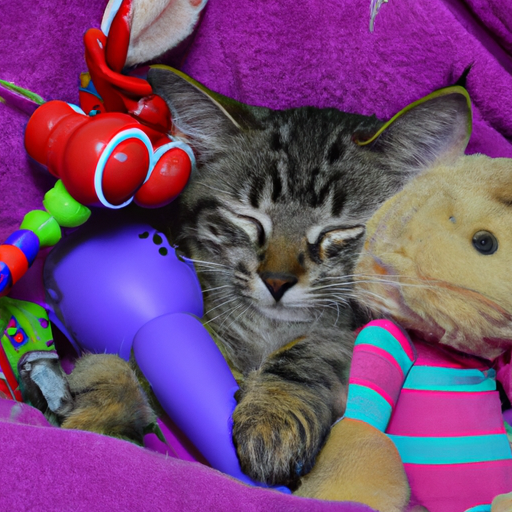If you’ve recently welcomed a playful, furry addition to your family in the form of a kitten, then you’ll want to ensure that your new feline friend grows up to be confident and well-adjusted. Kitten socialization plays a crucial role in shaping their future behavior and temperament. By providing positive experiences and exposure to various stimuli during their early months, you can build a strong foundation for a confident and sociable cat. In this article, we will explore the importance of kitten socialization and provide you with valuable tips on how to help your kitten become a confident feline companion. So, grab a cozy seat and get ready to discover the secrets to raising a happy and well-rounded kitty!
Understanding Kitten Socialization
Importance of early socialization
Early socialization is crucial for kittens as it helps them develop into well-adjusted and confident adult cats. It is during this period that kittens learn how to interact with humans, other animals, and their environment. Proper socialization increases their chances of forming strong bonds with their caregivers, being comfortable in various situations, and reducing the likelihood of fear-based behaviors in the future.
What is kitten socialization?
Kitten socialization refers to the process of exposing kittens to various stimuli, experiences, and interactions in a positive and controlled manner. It involves helping kittens feel at ease with handling, different environments, other animals, and people of different ages and genders. The aim is to prevent fear and aggression, and to create a confident and well-rounded feline companion.
The critical period for socialization
The critical period for kitten socialization occurs between two and seven weeks of age. During this time, kittens are highly impressionable and open to learning. It is vital to expose them to positive experiences and gentle handling during this period, as it sets the foundation for their future behavior and emotional well-being. While socialization can continue beyond this period, it becomes more challenging as kittens may become more cautious and fearful of new experiences.
The benefits of socializing kittens
Socializing kittens brings numerous benefits. It helps them develop into confident, friendly, and well-behaved cats. Kittens who are properly socialized are more likely to be comfortable and relaxed around new people and animals, reducing the chances of aggressive or fearful behavior. Socialization also helps prevent problem behaviors, like scratching or inappropriate elimination, as kittens learn appropriate outlets for their energy and natural feline behaviors.
Creating a Positive Environment
Safe and comfortable space
Creating a safe and comfortable space for your kitten is crucial. Provide a cozy bed, food and water bowls, and a clean litter box. Ensure the area is free from hazards and potential dangers, such as sharp objects or toxic plants. A quiet space, away from loud noises and excessive foot traffic, allows the kitten to feel secure and reduces stress.
Introducing new stimuli gradually
When socializing your kitten, introduce new stimuli gradually. Start with gentle sounds, such as soft music or household noises, and gradually expose them to louder sounds like vacuum cleaners or doorbells. Likewise, slowly introduce them to different scents, such as pet-friendly sprays or pheromone diffusers. Gradual exposure helps them acclimate to new experiences without overwhelming them.
Encouraging exploration and play
Encouraging exploration and play is an essential part of socialization. Provide stimulating toys, scratching posts, and interactive play sessions to keep your kitten engaged and mentally stimulated. This helps build their confidence and strengthens the bond between you and your kitten.
Providing a variety of experiences
Expose your kitten to a variety of experiences to broaden their socialization. Invite friends and family members of different ages and genders to interact with the kitten. Take the kitten to different areas of your home and gradually introduce them to different rooms and surfaces. Introducing them to new experiences such as car rides or walks in a secure harness also helps them become more adaptable and confident.
Positive Reinforcement Training
Using rewards for desired behaviors
Positive reinforcement training is an effective way to socialize kittens. Reward your kitten with treats, praise, or playtime for exhibiting desired behaviors like using the litter box or responding to basic commands. This positive association encourages kittens to repeat these behaviors, making them more likely to exhibit them in the future.
Clicker training for kittens
Clicker training can be a useful tool when socializing kittens. By using a clicker, you can associate the sound with positive reinforcement, creating a clear and consistent signal for desired behaviors. Clicker training is especially helpful for teaching kittens basic commands such as “sit” or “come” and helps build their focus and obedience.
Teaching basic commands
Teaching your kitten basic commands not only helps with their socialization but also establishes boundaries and improves their overall behavior. Start with simple commands like “sit” or “down,” using treats or clicker training as rewards. Be patient and consistent in your training, allowing your kitten to progress at their own pace.
Building trust through training
Training sessions are an excellent opportunity to build trust and strengthen the bond between you and your kitten. Keep the training sessions short and positive, ensuring that your kitten associates them with enjoyable experiences. Always end on a positive note by rewarding your kitten and providing affection after each session.
Handling and Touch Desensitization
Getting your kitten used to being handled
Getting your kitten used to being handled is crucial for their overall comfort and well-being. Start by gently touching and stroking them in areas they enjoy, such as their chin, cheeks, and back. Gradually introduce different types of touch, such as gentle massages or ear rubs, to familiarize them with various sensations.
Introducing gentle touches and caresses
As your kitten becomes more comfortable with handling, introduce gentle touches and caresses. Pay attention to their body language, ensuring they are welcoming the touch. Stroke your kitten in the direction they prefer and gradually increase the duration of the petting session as they become more relaxed.
Gradual desensitization to various touches
Gradual desensitization is essential for helping your kitten become comfortable with various touches. Introduce them to experiences such as having their paws touched, nails trimmed, or being brushed. Start with short, gentle touch sessions and gradually increase the duration and intensity as your kitten becomes more at ease.
Building trust and confidence through touch
Building trust and confidence through touch is a gradual process. Ensure that you approach your kitten calmly and with a gentle touch. Reinforce positive behaviors with treats or praise. By consistently providing positive experiences through touch, your kitten will associate being handled with feelings of security, trust, and love.
Socializing with Humans
Encouraging positive interactions
Encouraging positive interactions with humans is vital for your kitten’s socialization. Start by allowing them to approach you on their terms, avoiding forceful interactions. Offer treats and praise for friendly approaches and gradually increase the level of physical contact as your kitten becomes more comfortable.
Providing gentle and consistent handling
Gentle and consistent handling is key to fostering positive associations with humans. Avoid sudden movements or loud noises that may startle your kitten. Handle them with care, ensuring they feel secure, and provide treats or positive reinforcement to reward cooperative behavior.
Allowing supervised play with different people
Allowing supervised play with different people helps your kitten become comfortable around a variety of individuals. Invite friends or family members of different ages and genders to interact with the kitten. Encourage gentle play and ensure that the interactions remain positive and stress-free.
Exposing kittens to various ages and genders
Exposing kittens to individuals of various ages and genders is crucial to their social development. Different age groups and genders have distinctive scents, movements, and behaviors, and exposing kittens to this diversity helps them become comfortable and confident around a range of people.
Introducing Other Pets
Slow and controlled introductions
Introducing your kitten to other pets should be done slowly and under controlled circumstances. Start by scent swapping, where you exchange bedding between the pets to familiarize them with each other’s scents. Gradually progress to supervised visual introductions, in which the pets can see each other without direct physical contact.
Supervised interactions with other animals
Once your kitten and other pets have become familiar with each other’s scents, supervised interactions can begin. Keep initial interactions short and gradually increase their duration. Monitor the body language of all animals involved, and separate them if signs of aggression or stress occur.
Creating positive associations
Create positive associations between your kitten and other pets by offering treats, praise, or playtime when they are in each other’s presence. Gradually increase positive interactions, allowing the pets to engage in play and exploration together. Reinforce good behavior whenever they interact peacefully.
Gradually increasing exposure to other pets
As your kitten becomes more comfortable with the other pets, gradually increase their exposure and the length of time they spend together. Continue to monitor their interactions and provide guidance whenever necessary. Each positive experience helps strengthen their bond and fosters a harmonious relationship.
Exposure to Different Environments
Taking your kitten outside
Taking your kitten outside in a safe and controlled manner can be an enriching experience. Start by using a secure harness and leash. Allow your kitten to explore your backyard or a quiet outdoor area. Ensure the environment is free from potential dangers and never leave your kitten unattended.
Introducing them to different rooms in the house
Introduce your kitten to different rooms in your house to help them become familiar with their surroundings. Start with one room at a time, gradually allowing them access to the entire house. Supervise their exploration to ensure their safety and intervene if any potentially hazardous situations arise.
Gradually exposing them to new places
Gradually expose your kitten to new places beyond their home environment. This can include visits to friends’ houses, pet-friendly stores, or outdoor events. Keep these outings short initially, allowing your kitten to acclimate to new sights, sounds, and smells. Ensure their safety and comfort throughout the experience.
Ensuring a safe and controlled environment
Whenever exposing your kitten to different environments, prioritize their safety and well-being. Remove any potential hazards or toxic substances. Provide a familiar blanket or bed for them to retreat to if they become overwhelmed. By creating a safe and controlled environment, you allow your kitten to explore and adapt to new experiences confidently.
Enrolling in Socialization Classes
Benefits of professional socialization classes
Enrolling your kitten in professional socialization classes can offer numerous benefits. These classes provide structured socialization opportunities, exposing the kitten to a controlled environment with other animals and people. Trained professionals guide the interactions, ensuring positive experiences and addressing any behavioral concerns promptly.
Finding reputable trainers or classes
When looking for socialization classes, it’s essential to find reputable trainers or classes that prioritize positive reinforcement training techniques. Seek recommendations from veterinarians, friends, or fellow pet owners who have attended such classes. Research potential trainers, ensuring they have experience working with kittens and promote positive training methods.
What to expect from socialization classes
Socialization classes typically involve supervised play sessions, controlled introductions to other animals, and hands-on training exercises. Trainers may also address common behavioral issues and offer guidance on proper kitten care. Expect a supportive and nurturing environment where both you and your kitten can learn and thrive.
Supplementing at-home socialization
While socialization classes are beneficial, it’s important to supplement them with continued socialization at home. Regular interactions with family members and exposure to various environments and stimuli in a controlled manner reinforce the lessons learned in class and help your kitten become well-rounded and confident.
Dealing with Fear and Anxiety
Recognizing signs of fear or anxiety
It’s essential to recognize signs of fear or anxiety in your kitten. These may include cowering, hiding, excessive vocalization, or aggressive behavior. Pay attention to their body language, tail position, and ear movements. Recognizing these signs allows you to respond appropriately and help alleviate their distress.
Using positive reinforcement to alleviate fears
Positive reinforcement can be an effective tool in alleviating fear and anxiety in kittens. Reward confident and calm behaviors with treats and praise. Encourage their exploration and gently expose them to feared stimuli in a gradual and controlled manner, providing positive experiences alongside rewards.
Gradual exposure therapy for anxious kittens
For kittens with significant fear or anxiety, gradual exposure therapy can be beneficial. This involves slowly introducing them to feared stimuli and increasing exposure over time. Start with minimal exposure, gradually increasing the intensity or duration as your kitten becomes more comfortable. Always prioritize their emotional well-being and back off if signs of extreme stress occur.
Seeking professional help if necessary
If your kitten’s fear or anxiety persists despite your best efforts, or if it significantly affects their quality of life, it is important to seek professional help. A veterinarian or animal behaviorist can provide guidance, develop a behavior modification plan, or recommend additional resources such as medication or specialized training.
Continued Socialization in Adulthood
Importance of ongoing socialization
While the critical period for socialization occurs during kittenhood, ongoing socialization remains important throughout a cat’s life. Continue to expose your cat to different people, animals, and environments to maintain their confidence and adaptability. Interact with them regularly, engaging in play and providing mental stimulation to foster a positive relationship.
Maintaining positive experiences with people
Continue to expose your cat to positive experiences with people of different ages and genders. Encourage gentle interactions, rewarding your cat for friendly behavior. By keeping their interactions enjoyable and stress-free, you maintain their trust and ease any potential anxieties they may develop.
Interaction with other animals
Maintaining positive interactions with other animals is also essential for ongoing socialization. If your cat lives with other pets, ensure their interactions remain positive and supervised. Periodically expose them to new animals, gradually increasing their exposure and helping them maintain their social skills.
Exposure to new environments
Keep exposing your cat to new environments to broaden their experiences. Take them on supervised outdoor adventures, allow them to explore different rooms within your home, or provide new toys and scratching posts. Regular exposure to novel environments helps keep your cat curious and adaptable.
In conclusion, understanding and prioritizing kitten socialization is crucial for building a confident and well-rounded feline companion. By creating a positive environment, providing positive reinforcement training, gradually desensitizing them to handling and touch, socializing them with humans and other pets, introducing them to different environments, enrolling in socialization classes, addressing fear and anxiety, and continuing socialization throughout adulthood, you can ensure your kitten grows up to be a content and confident cat. With patience, consistency, and love, you can help your kitten become a cherished member of your family and community.








